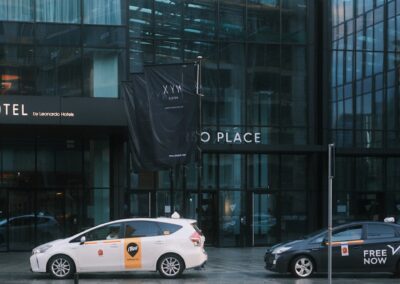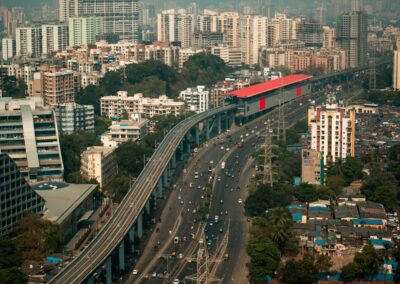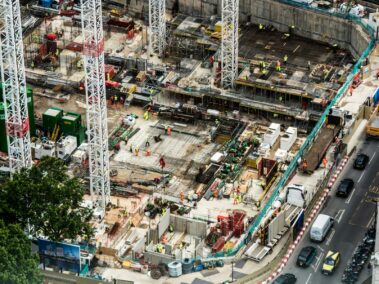Transforming Traffic Management with Predictive Analytics
Predictive analytics in traffic management has emerged as a game-changer for urban mobility, particularly in bustling cities like Riyadh and Dubai. As these cities continue to grow, managing traffic efficiently becomes paramount. Leveraging predictive analytics, which utilizes historical data and advanced algorithms, can forecast traffic patterns, optimize routing, and significantly reduce congestion. This article explores the integration of predictive analytics in traffic management systems and its potential to revolutionize urban mobility.
Enhancing Urban Mobility in Riyadh and Dubai
Predictive analytics plays a crucial role in enhancing urban mobility in Riyadh and Dubai. By analyzing vast amounts of data collected from various sources such as sensors, cameras, and GPS devices, predictive models can anticipate traffic congestion before it occurs. This proactive approach allows city planners and traffic management authorities to implement measures that can mitigate traffic jams, ensuring smoother traffic flow. In a city like Riyadh, where rapid urbanization has led to increased traffic challenges, predictive analytics provides a strategic solution to manage traffic effectively.
Moreover, Dubai, known for its futuristic vision, has embraced advanced technologies to transform its traffic management. Predictive analytics aids in identifying traffic hotspots and peak hours, enabling authorities to deploy resources more efficiently. For instance, adaptive traffic signals that adjust in real-time based on predictive data can significantly reduce waiting times at intersections. Such innovations not only improve traffic flow but also enhance the overall driving experience, making Dubai a global leader in smart city initiatives.
Optimizing Routing and Reducing Congestion
One of the most significant benefits of predictive analytics in traffic management is its ability to optimize routing. By predicting traffic patterns, these systems can recommend alternative routes to drivers, helping them avoid congested areas. This real-time routing optimization reduces travel times and minimizes fuel consumption, contributing to environmental sustainability. In cities like Riyadh and Dubai, where traffic congestion can lead to substantial economic losses, predictive analytics offers a cost-effective solution to enhance productivity and reduce delays.
Additionally, predictive analytics can integrate with other emerging technologies such as artificial intelligence (AI) and blockchain. AI can enhance the accuracy of predictive models by continuously learning from new data, while blockchain ensures data integrity and security. For example, AI-powered traffic management systems can dynamically adjust traffic signals, while blockchain can provide a secure platform for sharing traffic data among various stakeholders. This integration not only improves traffic management but also fosters a collaborative ecosystem for smarter cities.
Leveraging Executive Coaching and Change Management
The successful implementation of predictive analytics in traffic management also requires effective leadership and change management. Executive coaching services can play a vital role in guiding city leaders and traffic management authorities through this transformation. By fostering a culture of innovation and continuous improvement, executive coaches can help leaders navigate the complexities of integrating predictive analytics into existing systems. This ensures a smooth transition and maximizes the benefits of these advanced technologies.
Change management is equally crucial in this context. Introducing predictive analytics in traffic management systems involves significant changes in processes, technologies, and mindsets. A structured change management approach can address potential resistance and ensure that all stakeholders are aligned with the new vision. In cities like Dubai and Riyadh, where rapid technological advancements are the norm, effective change management can accelerate the adoption of predictive analytics and drive long-term success.
Future Prospects and Strategic Implications
The future of traffic management in Saudi Arabia and the UAE looks promising with the integration of predictive analytics. As cities continue to expand, the need for efficient traffic management solutions becomes increasingly critical. Predictive analytics not only addresses current traffic challenges but also paves the way for more innovative solutions in the future. For instance, the advent of the metaverse and generative artificial intelligence can further enhance predictive models, offering unprecedented insights into traffic patterns and driver behaviors.
Furthermore, management consulting firms specializing in smart city initiatives can provide strategic guidance to city planners and traffic authorities. By leveraging their expertise, cities like Riyadh and Dubai can develop comprehensive traffic management strategies that incorporate predictive analytics, AI, and blockchain. This holistic approach ensures that traffic management systems are resilient, scalable, and capable of adapting to future challenges.
#PredictiveAnalytics #TrafficManagement #AI #Blockchain #DubaiTraffic #RiyadhTraffic #ExecutiveCoaching #ChangeManagement #ManagementConsulting























